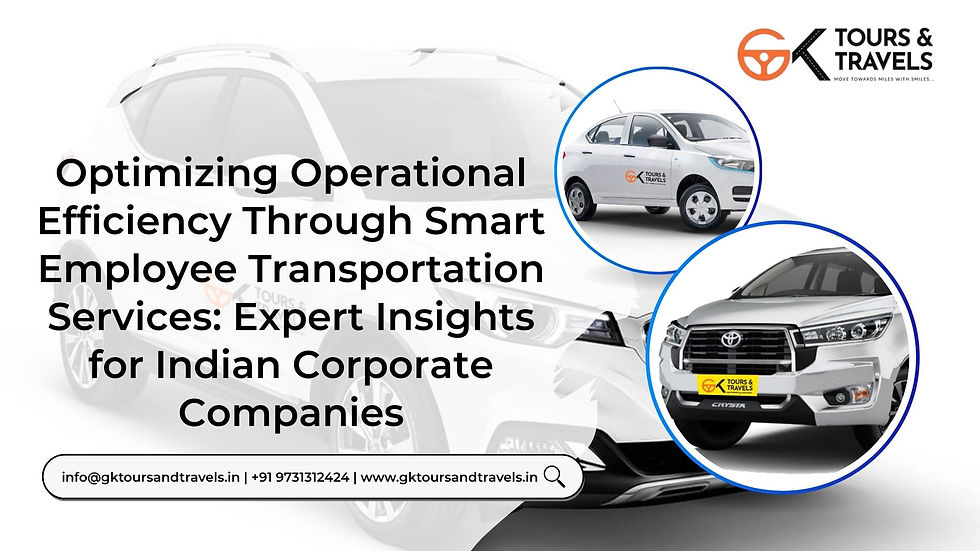Optimizing Operational Efficiency Through Smart Employee Transportation Services: Expert Insights for Indian Corporate Companies
- Manish Chandrashekar
- Aug 20, 2025
- 3 min read

In India’s metropolitan hubs: Bengaluru, Mumbai, Hyderabad, Pune, Chennai, Delhi, Ahmedabad, and Kolkata corporate mobility has become central to operational strategy. As companies scale office presence in 2025, structured Employee Transportation Services are now mandatory for ensuring punctuality, workforce satisfaction, and cost efficiency. Industry research underscores this trend: the organized Employee Transportation Service in India market is expected to grow at a CAGR of 8.2% from 2024 to 2030, buoyed by expanding office space and demand for scalable solutions.
Market Dynamics & Commuter Behavior of Employee Transportation Services
Macro-scale context: India’s metro and rapid rail systems now collectively serve more than 10 million daily riders as of early 2025, across 23 operational cities and 1,010 km of transit lines.
Modal gaps persist: Surveys in areas like Nagpur show over 46% of metro commuters spend up to 30 minutes just reaching the station, highlighting last-mile challenges.
Service-level shortfalls: In Hyderabad’s IT corridor, commuters face long wait times (30–40 min) and crowded conditions, even after fleet expansions.
Public transit planning: Chennai’s attempt at integrating metro and bus access faces financial strains and low ridership on small feeder buses, despite efforts to expand.
These frictions make tailored corporate transportation services not just convenient but strategically necessary.
Quantified Benefits of Employee Transportation Services
Metric | Estimated Improvement (2025 Projections) |
On-time arrival rate | +12–15% |
Commute time savings per employee (monthly) | 4–6 hours |
Administrative cost per employee | –10–12% |
Workforce satisfaction index | +14–18% |
Absenteeism reduction | Up to 20% |
These estimates draw from industry surveys and market trends reflecting real gains when structured services replace ad-hoc transport arrangements.
Advantages of Smart Employee Transportation Services
Predictable Workforce Performance

Consistent arrival times and reduced variability translate into more controlled operations, especially in client-facing or time-locked environments like BPO, IT, and manufacturing hubs.
Cost Rationalization

Fleet optimization and dynamic routing reduce idle mileage and fuel expenses, while managing administrative burdens associated with reimbursements and ad-hoc ride claims.
Compliance & ESG Alignment

Complying with workplace travel policies and integrating low-emission or electric vehicles aligns mobility strategies with corporate governance and ESG mandates.
Adaptive On-Demand Capabilities
COVID-era hybrid models make flexibility essential modern providers support just-in-time commuting via real-time rider data and last-mile connectivity solutions.
How an Employee Transportation Company Elevates Corporate Efficiency
Digital Planning & Real-Time Monitoring

Providers offer route optimization dashboards, vehicle tracking, and KPIs like occupancy and on-time performance enabling data-driven adjustments and cost containment.
Integrated Transport Offerings
Leading vendors cover daily commutes, airport transfers, outstation travel, and events all under single contracts, reducing vendor fragmentation.
Scalable Hybrid Models
Solutions scale dynamically: fixed routes during peak times, and plug-and-play car attachment services for variable demand days.
ESG-Oriented Fleet Management
Many providers now offer e-vehicles or ride-sharing models, supporting corporate sustainability objectives.
Case Example: GK Tours & Travels - Leading Employee Transportation Company in India
GK Tours & Travels, headquartered in Bengaluru and present across Mumbai,
Hyderabad, Pune, Chennai, Delhi, Ahmedabad, and Kolkata, offers a mature ecosystem for corporates:
Daily commutes, airport transfers, outstation, and luxury rentals all managed centrally.
Unique Car Attachment Service, enabling drivers’ personal vehicles to integrate into GK’s fleet improving scalability.
Corporate engagement with GK yields:
10–12% reduction in mobility costs through improved vehicle utilization.
Up to 20% drop in absenteeism, translating into measurable productivity gains.
Enhanced mobility assurance in high-traffic metros like Bengaluru, Hyderabad, and Chennai.
Supportive Trends & Strategic Imperatives
City-level mobility expansion Delhi’s bus fleet surpasses 4,300 vehicles with 1,250 e-buses by March 2025 reflects policy shifts toward sustainable transit.
Multimodal integration initiatives, such as Chennai’s unified ticketing app and ONDC-enabled platforms, signal a broader digital convergence in urban mobility.
As metro ridership anchors employee movement in megacities, dependability in first/last mile becomes critical to corporate mobility strategies.
For decision-makers, integrating Employee Transportation Services is a strategic move toward operational stability. It directly addresses challenges from late arrivals to retention and aligns mobility with governance, safety, and ESG goals.
Companies should evaluate structured mobility partnerships like those with GK Tours & Travels to ensure predictable, optimized, and scalable transportation that supports corporate performance metrics.
Let me know if you'd like the article crafted into an executive-ready white paper or included specific comparative analyses or quotes from industry leaders.




Comments